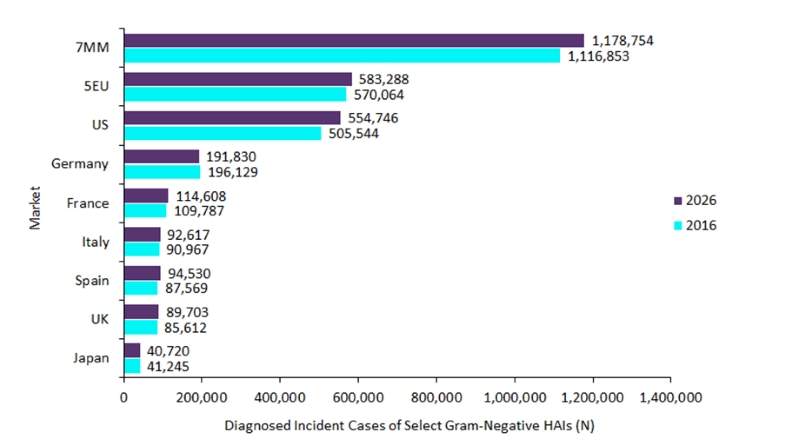
Diagnosed incident cases of healthcare-associated gram-negative infections is expected to increase between 2016 and 2026 in the seven major markets (7MM) of the US, France, Germany, Italy, Spain, the UK and Japan.
GlobalData epidemiologists forecast an increase in the number of diagnosed cases, most notably in the US. Figure 1 presents the expected changes in diagnosed incident cases of select gram-negative hospital-aquired infections (HAI) in the 7MM from 2016 to 2026 in adults aged ≥18 years.
Figure 1: 7MM, Diagnosed Incident Cases of Select HAIs, Men and Women, Ages ≥18 Years, 2016–2026. Source: GlobalData

HAIs are a major threat to patient safety and place a substantial economic burden on healthcare systems. They occur in hospitalised patients and are not present at the time of admission.
The most common types of HAI is related to the use of invasive devices or surgical procedures and falls into the catheter-associated urinary tract infection (CAUTI), central line-associated bloodstream infection (CLABSI), hospital-associated pneumonia (HAP) / ventilator-associated pneumonia (VAP), and surgical site infection (SSI) categories.
How well do you really know your competitors?
Access the most comprehensive Company Profiles on the market, powered by GlobalData. Save hours of research. Gain competitive edge.

Thank you!
Your download email will arrive shortly
Not ready to buy yet? Download a free sample
We are confident about the unique quality of our Company Profiles. However, we want you to make the most beneficial decision for your business, so we offer a free sample that you can download by submitting the below form
By GlobalDataInfections caused by gram-negative bacteria are of particular public health concern, as they are at the root of approximately 30%-70% of HAIs worldwide. Gram-negative bacteria are highly efficient at altering their genetic makeup to combat antibiotics, and often use a variety of mechanisms against the same antibiotic, or one mechanism against several antibiotics.
Amplifying the issue of drug resistance is the reduction of drug discovery and development paired with the overuse of antibiotics. As a result, drug resistance continues to increase, and gram-negative HAIs continue to persist and spread.
GlobalData epidemiologists forecast that the diagnosed incident cases of gram-negative catheter-associated urinary tract infection (CAUTI), central line associated blood stream infections (CLABSI), hospital-acquired pneumonia (HAP), ventilator-associated pneumonia (VAP), and surgical site infection (SSI) in the 7MM will grow by an AGR of 0.55% a year over the next ten years, from 1,116,853 cases in 2016 to 1,178,754 cases in 2026. This increase can be attributed to changes in the underlying population structure of each market.
In the 7MM, the US had the highest number of diagnosed incident cases, with 505,544 in 2016, while Japan will have the lowest number of diagnosed incident cases, with 41,245 in 2016.
Related Reports
• GlobalData (2017). PharmaPoint: Healthcare-Associated Gram-Negative Infections – Global Drug Forecast and Market Analysis to 2026, GDHC147PIDR.
• GlobalData (2017). EpiCast: Healthcare-Associated Gram-Negative Infections – Epidemiology Forecast to 2026, GDHCER157-17.



